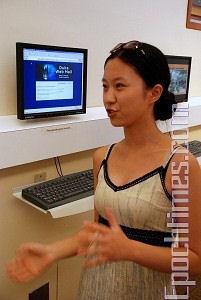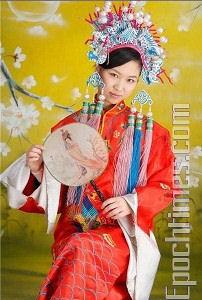On April 9, during a conflict between two groups on the Tibetan human rights issue at Duke University in North Carolina, Chinese foreign student Grace Wang (Qianyun) attempted to mediate both sides. One side supported a “free Tibet” movement and the other side, mainly Chinese foreign students, opposed international intervention and outcries of the massacre in Tibet. Wang’s action made herself a target of abuse from her countrymen.
Regarding the incident, and the continuous assaults on the Internet, Wang commented in an interview with The Epoch Times on April 19, “The love for country is not love for a party or a government. The true love for a country is for the advancement of the country. True patriots are those who dare to offer an honest discussion that is offensive to the ears.”
“There are many problems in China, and the root of all problems is the current political system. The Chinese Communist Party’s (CCP) instigation of nationalism is ’making its own coffin.'”
What Is True Patriotism?
Wang thinks the Chinese student assembly at Duke University opposing the Tibetan human rights activity was not an act of patriotism, but a harmful act against China. They were merely doing something immoral to please themselves.
As for what is true patriotism, she said, “What can truly advance a country is not consenting voices but critical voices. What can truly strengthen a country is not to gag the public but to allow the public to express differing opinions.”
She said, “In a normal society today, there are many opposing parties, many opposing voices, and the media shoulders the function to correct abnormal things in society. Criticism is a common means used by the media. But in China, the media is basically a tool of the Chinese Communist Party (CCP) to attack the opposition, and a tool for deceit. There is not much useful news on China Central TV Station (CCTV) for us to watch, there are few true words. Lying is a profession to CCTV.”
Differentiate China From the CCP
When commenting about what the greatest aspect of communist “party culture” is on the people, Wang indicated, “The inability to differentiate China from the CCP is an important part.”
Everything the CCP says ties four concepts together—the party, country, government and the people. Wang said, “Tying them all together is a psychological game. They have been instilling this mentality into people’s minds all along.”
Instigating Nationalism Is ‘Making a Coffin for Itself’
Regarding the CCP’s hatred instigated against CNN and its anti-Western rhetoric, Wang shared, “This is too foolish. The source of Chinese people’s national sentiment is the CCP. The CCP is incapable of resolving many of its own problems, so it tries to get around the problems by shifting the focus.”
She said, “On one hand, the CCP offended Western society; on the other hand, it offended the Chinese people. When it used the Chinese public as a tool for incitement, it slighted the power of the public. All strong tools are double edged swords that can be used to attack others yet it can also backfire.”
Wang indicated, “Although part of the Chinese public may have the tendency of nationalism in this specific time period, but they are not completely blind. Their anger may turn to the CCP possibly several months later, or suddenly.”
“Some people participated in the movement as a way of venting their anger. I feel this kind of venting is normal. But after a while, a new development will appear, people will test what kind of subject they can talk about, what kind of benefit they can struggle to achieve, they will keep pushing the limit; people’s power will become integrated, then big changes will occur. The momentum is building.”
The Political System Is the Root of All Problems in China
Wang expressed, “There are lots of problems in China, the root is the political system. The censorship policy is an example. The CCP thinks the censorship of ideas will further steady the regime. It is terrifying that the CCP places the stability of their power as the utmost importance, this is actually the most unreliable way to retain power.”
The CCP has used economic growth to cover up the domestic social problems. To this, Wang says, “If a person does not have foresight, he is likely to have troubles in the near future. The small economic benefit at the present is hardly sufficient. In fact, the current economic development in China is not very good, not very stable. Politics and many other factors all affect economy.”
Various economic problems have already appeared in Mainland China, such as the sky rocketing commodity prices, the steep drop in the stock market, the housing market bubble, resources shortage, and flight of foreign capital, etc.
Wang said, “In economics, expectation is a very important concept. If you have a healthy expectation, a forward looking expectation, it is a very good road to walk on. Expectation is often determined by the government. If the government system is not good and the regulations are falling behind, people will be cautious in investing, because the accumulated capital from years of development may be wiped out by government plunder or by a single change in government policy. This kind of instability will encourage serious sentiments of speculation, and there will be little chance for the economy to be built up as real national capital.”
She continued, “There has been deceit and lagging behind in economic policy under the CCP regime. It does not move along with the times but lags behind, it relies on the foundation that was built in the past. To move forward, it needs accumulation, and it needs a rational political system as its foundation. Otherwise, it may collapse suddenly.
“Now, all the hidden dangers have already emptied the entire wealth base, before then, it still looked like a dying thin camel that is seemingly stronger than a horse. But in reality, as the domestic problem gets bigger, the possibility of collapse has become greater.”
The Regime Will Destroy Itself in Our Generation
The CCP is fanning nationalism overseas on the Olympics issue, attempting to show the West its strong grassroots’ support. Wang thinks, on the contrary, the CCP’s power is getting weak, “During the Cultural Revolution, the CCP probed every part of society to test people’s loyalty. During the Tiananmen Square Massacre, the CCP was very scared of people’s power, when it found any sign of instability it will suppress it. But now, it can only try to stop people after they act.
“Now the CCP cannot foresee what people will do. Hence every time something happens, the CCP will change itself to cater to the people. The regime has lost the capability of stopping people from wanting to do anything,” said Wang, “The one who wins the people’s heart rules the world. The CCP regime won’t last long, it will destroy itself by the way it’s doing things.
“The people no longer trust the government and now the government also doesn’t trust the people. Government officials don’t even trust each other. Everyone finds himself in danger.
“Since the uprising in Tibet, a trend rose in the international community - people started to exclude the Chinese government and the abnormal ideology it forces upon its people.”
Chinese Traditions Are Valuable



